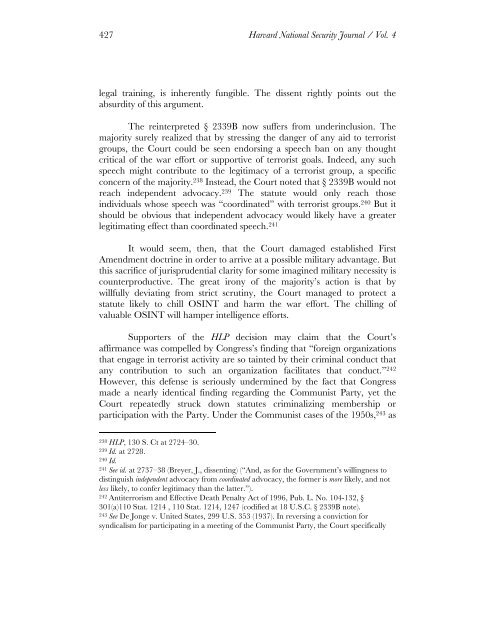Vo.4-Moshirnia-Final
Vo.4-Moshirnia-Final
Vo.4-Moshirnia-Final
Create successful ePaper yourself
Turn your PDF publications into a flip-book with our unique Google optimized e-Paper software.
427 Harvard National Security Journal / Vol. 4<br />
legal training, is inherently fungible. The dissent rightly points out the<br />
absurdity of this argument.<br />
The reinterpreted § 2339B now suffers from underinclusion. The<br />
majority surely realized that by stressing the danger of any aid to terrorist<br />
groups, the Court could be seen endorsing a speech ban on any thought<br />
critical of the war effort or supportive of terrorist goals. Indeed, any such<br />
speech might contribute to the legitimacy of a terrorist group, a specific<br />
concern of the majority. 238 Instead, the Court noted that § 2339B would not<br />
reach independent advocacy. 239 The statute would only reach those<br />
individuals whose speech was “coordinated” with terrorist groups. 240 But it<br />
should be obvious that independent advocacy would likely have a greater<br />
legitimating effect than coordinated speech. 241<br />
It would seem, then, that the Court damaged established First<br />
Amendment doctrine in order to arrive at a possible military advantage. But<br />
this sacrifice of jurisprudential clarity for some imagined military necessity is<br />
counterproductive. The great irony of the majority’s action is that by<br />
willfully deviating from strict scrutiny, the Court managed to protect a<br />
statute likely to chill OSINT and harm the war effort. The chilling of<br />
valuable OSINT will hamper intelligence efforts.<br />
Supporters of the HLP decision may claim that the Court’s<br />
affirmance was compelled by Congress’s finding that “foreign organizations<br />
that engage in terrorist activity are so tainted by their criminal conduct that<br />
any contribution to such an organization facilitates that conduct.” 242<br />
However, this defense is seriously undermined by the fact that Congress<br />
made a nearly identical finding regarding the Communist Party, yet the<br />
Court repeatedly struck down statutes criminalizing membership or<br />
participation with the Party. Under the Communist cases of the 1950s, 243 as<br />
238 HLP, 130 S. Ct at 2724–30.<br />
239 Id. at 2728.<br />
240 Id.<br />
241 See id. at 2737–38 (Breyer, J., dissenting) (“And, as for the Government’s willingness to<br />
distinguish independent advocacy from coordinated advocacy, the former is more likely, and not<br />
less likely, to confer legitimacy than the latter.”).<br />
242 Antiterrorism and Effective Death Penalty Act of 1996, Pub. L. No. 104-132, §<br />
301(a)110 Stat. 1214 , 110 Stat. 1214, 1247 (codified at 18 U.S.C. § 2339B note).<br />
243 See De Jonge v. United States, 299 U.S. 353 (1937). In reversing a conviction for<br />
syndicalism for participating in a meeting of the Communist Party, the Court specifically
















